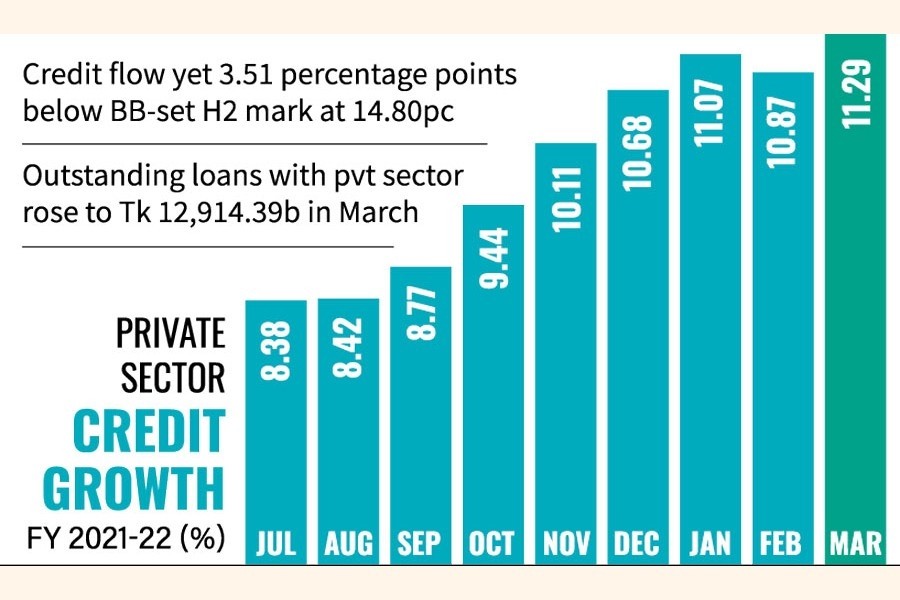Credit flow into Bangladesh's private sector rebounds, after a downturn, on a demand surge for loans largely for trade financing amid rise in economic activity.
Sources say settling higher import-payment obligations has led to demand growth for credits since March, after a February slump.
The country's overall import expenses increased significantly under a cascading impact of a fresh spurt in prices of essential commodities, including fuel oils, on the global market.
The latest inflationary pressure stems from the ongoing Russia-Ukraine war, many a banker and economist say.
The credit disbursement rose to 11.29 per cent in March 2022 on a year-on-year basis, from 10.87 per cent a month before, according to the central bank's latest statistics.
The private-sector credits accounted for 11.07 per cent in January.
Notwithstanding the rebound, it was 3.51-percentage points lower than the Bangladesh Bank (BB)-target 14.80 per cent for the second half (H2) of the current fiscal year (FY) 2021-22.
"The private-sector credits rebounded in March following higher import-payment obligations as well as the reopening of economic activities fully," a BB senior official told the FE Tuesday.
Higher prices of essential commodities, including petroleum products, on the global market besides the upcoming Eid-ul-Fitr festival also pushed up import payments during the period under review, the central banker explained.
Normally, a large quantity of essential commodities is imported to meet the additional demand of consumers during the month of Ramadan, the month of fasting and functions.
"The import-payment pressure on the economy is likely to ease in the coming months as the central bank has already imposed margin on letter of credit (LC) for all imports, save some essentials," the central banker predicts.
Earlier on April 11, the central bank imposed minimum 25-percent cash LC margin on all imports excepting some essential items, aiming to ease import-payment pressure on the economy.
Talking to the FE, Syed Mahbubur Rahman, Managing Director (MD) and chief executive officer (CEO) of Mutual Trust Bank Limited, said the existing trend of such credit growth may continue in the near future.
"But it will depend on liquidity mobilization," the senior banker explained.
He also notes that higher post-import financing contributed to increase in the private-sector-credit growth during the period under review.
Meanwhile, the settlement of letters of credit (LC), generally known as actual import, in terms of value, rose by nearly 50 per cent to $60.57 billion during the July-March period of FY'22, from $40.48 billion in the same period of the previous fiscal, according to the central bank's latest statistics.
On the other hand, the opening of LCs, generally known as import orders, grew by more than 46 per cent to $68.36 billion during the period from $46.81 billion in the same period of FY '21.
Actually, Bangladesh's overall imports have increased significantly in recent months, following gradual reopening of economic activities - both at domestic and global levels - after more than one year of Covid-19 pandemic upset.
Meanwhile, outstanding loans with the private sector rose to Tk 12,914.39 billion in March 2022 from Tk 11,603.83 billion in the same month of 2021.
The amount was Tk 11,888.55 billion in June 2021.


